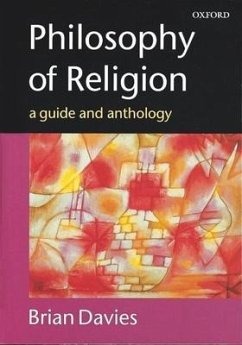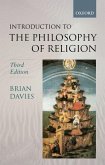- Broschiertes Buch
- Merkliste
- Auf die Merkliste
- Bewerten Bewerten
- Teilen
- Produkt teilen
- Produkterinnerung
- Produkterinnerung
Both an anthology and commentary, this text presents a self-contained introduction to the philosophy of religion. Readings focus on questions which have preoccupied Western philosophers when thinking about religion, such as the existence and nature of God and the question of life after death.
Andere Kunden interessierten sich auch für
![An Introduction to the Philosophy of Religion An Introduction to the Philosophy of Religion]() Brian Davies (, Professor of Philosophy at Fordham University, NewAn Introduction to the Philosophy of Religion50,99 €
Brian Davies (, Professor of Philosophy at Fordham University, NewAn Introduction to the Philosophy of Religion50,99 €![Kierkegaard Kierkegaard]() Patrick Gardiner (, formerly a Fellow of Magdalen College, Oxford)Kierkegaard17,99 €
Patrick Gardiner (, formerly a Fellow of Magdalen College, Oxford)Kierkegaard17,99 €![The Koran: A Very Short Introduction The Koran: A Very Short Introduction]() Michael Cook (Cleveland E. Dodge Professor in the Department of NeaThe Koran: A Very Short Introduction17,99 €
Michael Cook (Cleveland E. Dodge Professor in the Department of NeaThe Koran: A Very Short Introduction17,99 €![Augustine: A Very Short Introduction Augustine: A Very Short Introduction]() Henry Chadwick (For Formerly Regius Professor Emeritus of DivinityAugustine: A Very Short Introduction17,99 €
Henry Chadwick (For Formerly Regius Professor Emeritus of DivinityAugustine: A Very Short Introduction17,99 €![Paul Paul]() E. P. Sanders (Arts and Arts Sciences Professor of Religion and ScPaul17,99 €
E. P. Sanders (Arts and Arts Sciences Professor of Religion and ScPaul17,99 €![Rousseau Rousseau]() Robert Wokler (, formerly Senior Lecturer in Political Science, YalRousseau17,99 €
Robert Wokler (, formerly Senior Lecturer in Political Science, YalRousseau17,99 €![Schopenhauerp Schopenhauerp]() Christopher Janaway (, Birkbeck College, University of London)Schopenhauerp17,99 €
Christopher Janaway (, Birkbeck College, University of London)Schopenhauerp17,99 €-
-
-
Both an anthology and commentary, this text presents a self-contained introduction to the philosophy of religion. Readings focus on questions which have preoccupied Western philosophers when thinking about religion, such as the existence and nature of God and the question of life after death.
Hinweis: Dieser Artikel kann nur an eine deutsche Lieferadresse ausgeliefert werden.
Hinweis: Dieser Artikel kann nur an eine deutsche Lieferadresse ausgeliefert werden.
Produktdetails
- Produktdetails
- Verlag: Oxford University Press
- Seitenzahl: 784
- Erscheinungstermin: 27. Juli 2000
- Englisch
- Abmessung: 247mm x 172mm x 42mm
- Gewicht: 1354g
- ISBN-13: 9780198751946
- ISBN-10: 019875194X
- Artikelnr.: 21350261
- Herstellerkennzeichnung
- Libri GmbH
- Europaallee 1
- 36244 Bad Hersfeld
- gpsr@libri.de
- Verlag: Oxford University Press
- Seitenzahl: 784
- Erscheinungstermin: 27. Juli 2000
- Englisch
- Abmessung: 247mm x 172mm x 42mm
- Gewicht: 1354g
- ISBN-13: 9780198751946
- ISBN-10: 019875194X
- Artikelnr.: 21350261
- Herstellerkennzeichnung
- Libri GmbH
- Europaallee 1
- 36244 Bad Hersfeld
- gpsr@libri.de
Professor Brian Davies is Professor of Philosophy, Fordham University, New York. He is a Catholic Priest and Dominican Friar and General Editor of the series 'Outstanding Christian Thinkers' published by Geoffrey Chapman, London and 'Medieval Minds' published by Oxford University Press. His many articles on Philosophy of Religion and Theology are widely published and he has contributed to several published titles.
* Preface
* General Introduction
* Advice on Reading
* PART I. PHILOSOPHY AND RELIGIOUS BELIEF
* Introduction
* 1: Thomas Aquinas: Faith and Reason in Harmony
* 2: W.K. Clifford: The Ethics of Belief
* 3: Antony Flew: The Presumption of Atheism
* 4: Alvin Plantinga: Religious Belief as 'Properly Basic'
* 5: Norman Kretzmann: Evidence and Religious Belief
* 6: D.Z. Phillips: Grammar and Religious Belief
* 7: Norman Malcolm: The Groundlessness of Religious Belief
* Questions for Discussion
* Advice on Further Reading
* PART II. THE PROBLEM OF GOD-TALK
* Introduction
* 8: Augustine of Hippo: How Believers Find God-Talk Puzzling
* 9: A.J. Ayer: God-Talk is Evidently Nonsense
* 10: Richard Swinburne: God-Talk is Not Evidently Nonsense
* 11: Antony Flew: 'Death by a Thousand Qualifications'
* 12: Thomas Aquinas: One Way of Understanding God-Talk
* Questions for Discussion
* Advice on Reading
* PART III. ARGUMENTS FOR GOD'S EXISTENCE
* Introduction
* Advice on Reading
* Cosmological Arguments
* Introduction
* 13: Anselm of Canterbury: A Concise Cosmological Argument from the
Eleventh Century
* 14: Thomas Aquinas: A Thirteenth Century Cosmological Argument
* 15: John Duns Scotus: A Fourteenth-Century Cosmological Argument
* 16: Gottfried Wilhelm Leibniz: A Seventeenth-Century Cosmological
Argument
* 17: Herbert McCabe: A Modern Cosmological Argument
* 18: Paul Edwards: Objections to Cosmological Arguments
* 19: J.L. Mackie: More Objections to Cosmological Arguments
* 20: David Hume: Why is a Cause Always Necessary?
* 21: G.E.M. Anscombe: 'Whatever Has a Beginning of Existence Must Have
a Cause'
* 22: James A. Sadowsky: Can there be an Endless Regress of Causes?
* Questions for Discussion
* Advice on Further Reading
* Design Arguments
* Introduction
* 29: Anselm of Canterbury: Anselm Argues That God Cannot Be Thought
Not To Exist
* 30: Gaunilo of Marmoutiers: Gaunilo Argues that Anselm is Wrong
* 31: Anselm of Canterbury: Anselm Replies to Gaunilo
* 32: René Descartes: Descartes Defends An Ontological Argument
* 33: Pierre Gassendi, Johannes Caterus, René Descartes: Descartes
Replies to Critics
* 34: Immanuel Kant: A Classic Repudiation of Ontological Arguments
* 35: Alvin Plantinga: A Contemporary Defence of Ontological Arguments
* Questions for Discussion
* Advice on Reading
* God and Human Experience
* Introduction
* 36: C.B. Martin: Why 'Knowing God by Experience' is a Notion Open to
Question
* 37: Peter Donovan: Can We Know God by Experience?
* 38: William P. Alston: Why Should There Not Be Experience of God?
* Questions for Discussion
* Advice on Reading
* PART IV. WHAT IS GOD?
* Introduction
* Advice on Further Reading
* Omnipotent
* Introduction
* 39: Thomas V. Morris: A Modern Discussion of Divine Omnipotence
* 40: Thomas Aquinas: Why Think of God as Omnipotent?
* 41: Richard Swinburne: Miracles and Laws of Nature
* 42: David Hume: Why We Should Disbelieve in Miracles
* Questions for Discussion
* Advice on Reading
* Knowing
* Introduction
* 43: Thomas Aquinas: Why Ascribe Knowledge to God?
* 44: Boethius: Omniscience and Human Freedom: a Classic Discussion
* 45: Nelson Pike: Problems for the Notion of Divine Omniscience
* Questions for Discussion
* Advice on Further Reading
* Eternal
* Introduction
* 46: Thomas Aquinas: Why Call God 'Eternal'?
* 47: Nicholas Wolterstorff: God is 'Everlasting', not 'Eternal'
* 48: Eleonore Stump and Norman Kretzmann: A Modern Defence of Divine
Eternity
* 49. A Different Modern Defence of Divine Eternity: Paul Helm
* Questions for Discussion
* Advice on Reading
* Simple
* Introduction
* 50: Thomas Aquinas: A Classic Defence of Divine Simplicity
* 51: Thomas V. Morris: Problems with Divine Simplicity
* 52: Brian Davies: A Modern Defence of Divine Simplicity
* Questions for Discussion
* Advice on Further Reading
* Part V. THE PROBLEM OF EVIL
* Introduction
* 53: J.L. Mackie: Evil Shows that there is no God
* 54: Augustine of Hippo: What is Evil?
* 55: Richard Swinburne: Evil Does Not Show That There Is No God
* 56: Herbert McCabe: God, Evil, and Divine Responsibility
* 57: Thomas Aquinas: God and Human Freedom
* Questions for Discussion
* Advice on Reading
* Part VI. MORALITY AND RELIGION
* Introduction
* 58: Immanuel Kant: God as a 'Postulate' of Sound Moral Thinking
* 59: H.P. Owen: Why Morality Implies the Existence of God
* 60: Illtyd Trethowan: Moral Thinking as Awareness of God
* 61: Kai Nielsen: Morality does not Imply the Existence of God
* Questions for Discussion
* Advice on Further Reading
* Part VII. PEOPLE AND LIFE AFTER DEATH
* Introduction
* 62: Stephen T. Davis: Philosophy and Life After Death: The Questions
and the Options
* 63: Plato: Life After Death: An Ancient Greek View
* 64: Bertrand Russell: Belief in Life After Death Comes from Emotion,
not Reason
* 65: Peter Geach: What Must be True of Me If I Survive My Death?
* Questions for Discussion
* Advice on Further Reading
* Index
* General Introduction
* Advice on Reading
* PART I. PHILOSOPHY AND RELIGIOUS BELIEF
* Introduction
* 1: Thomas Aquinas: Faith and Reason in Harmony
* 2: W.K. Clifford: The Ethics of Belief
* 3: Antony Flew: The Presumption of Atheism
* 4: Alvin Plantinga: Religious Belief as 'Properly Basic'
* 5: Norman Kretzmann: Evidence and Religious Belief
* 6: D.Z. Phillips: Grammar and Religious Belief
* 7: Norman Malcolm: The Groundlessness of Religious Belief
* Questions for Discussion
* Advice on Further Reading
* PART II. THE PROBLEM OF GOD-TALK
* Introduction
* 8: Augustine of Hippo: How Believers Find God-Talk Puzzling
* 9: A.J. Ayer: God-Talk is Evidently Nonsense
* 10: Richard Swinburne: God-Talk is Not Evidently Nonsense
* 11: Antony Flew: 'Death by a Thousand Qualifications'
* 12: Thomas Aquinas: One Way of Understanding God-Talk
* Questions for Discussion
* Advice on Reading
* PART III. ARGUMENTS FOR GOD'S EXISTENCE
* Introduction
* Advice on Reading
* Cosmological Arguments
* Introduction
* 13: Anselm of Canterbury: A Concise Cosmological Argument from the
Eleventh Century
* 14: Thomas Aquinas: A Thirteenth Century Cosmological Argument
* 15: John Duns Scotus: A Fourteenth-Century Cosmological Argument
* 16: Gottfried Wilhelm Leibniz: A Seventeenth-Century Cosmological
Argument
* 17: Herbert McCabe: A Modern Cosmological Argument
* 18: Paul Edwards: Objections to Cosmological Arguments
* 19: J.L. Mackie: More Objections to Cosmological Arguments
* 20: David Hume: Why is a Cause Always Necessary?
* 21: G.E.M. Anscombe: 'Whatever Has a Beginning of Existence Must Have
a Cause'
* 22: James A. Sadowsky: Can there be an Endless Regress of Causes?
* Questions for Discussion
* Advice on Further Reading
* Design Arguments
* Introduction
* 29: Anselm of Canterbury: Anselm Argues That God Cannot Be Thought
Not To Exist
* 30: Gaunilo of Marmoutiers: Gaunilo Argues that Anselm is Wrong
* 31: Anselm of Canterbury: Anselm Replies to Gaunilo
* 32: René Descartes: Descartes Defends An Ontological Argument
* 33: Pierre Gassendi, Johannes Caterus, René Descartes: Descartes
Replies to Critics
* 34: Immanuel Kant: A Classic Repudiation of Ontological Arguments
* 35: Alvin Plantinga: A Contemporary Defence of Ontological Arguments
* Questions for Discussion
* Advice on Reading
* God and Human Experience
* Introduction
* 36: C.B. Martin: Why 'Knowing God by Experience' is a Notion Open to
Question
* 37: Peter Donovan: Can We Know God by Experience?
* 38: William P. Alston: Why Should There Not Be Experience of God?
* Questions for Discussion
* Advice on Reading
* PART IV. WHAT IS GOD?
* Introduction
* Advice on Further Reading
* Omnipotent
* Introduction
* 39: Thomas V. Morris: A Modern Discussion of Divine Omnipotence
* 40: Thomas Aquinas: Why Think of God as Omnipotent?
* 41: Richard Swinburne: Miracles and Laws of Nature
* 42: David Hume: Why We Should Disbelieve in Miracles
* Questions for Discussion
* Advice on Reading
* Knowing
* Introduction
* 43: Thomas Aquinas: Why Ascribe Knowledge to God?
* 44: Boethius: Omniscience and Human Freedom: a Classic Discussion
* 45: Nelson Pike: Problems for the Notion of Divine Omniscience
* Questions for Discussion
* Advice on Further Reading
* Eternal
* Introduction
* 46: Thomas Aquinas: Why Call God 'Eternal'?
* 47: Nicholas Wolterstorff: God is 'Everlasting', not 'Eternal'
* 48: Eleonore Stump and Norman Kretzmann: A Modern Defence of Divine
Eternity
* 49. A Different Modern Defence of Divine Eternity: Paul Helm
* Questions for Discussion
* Advice on Reading
* Simple
* Introduction
* 50: Thomas Aquinas: A Classic Defence of Divine Simplicity
* 51: Thomas V. Morris: Problems with Divine Simplicity
* 52: Brian Davies: A Modern Defence of Divine Simplicity
* Questions for Discussion
* Advice on Further Reading
* Part V. THE PROBLEM OF EVIL
* Introduction
* 53: J.L. Mackie: Evil Shows that there is no God
* 54: Augustine of Hippo: What is Evil?
* 55: Richard Swinburne: Evil Does Not Show That There Is No God
* 56: Herbert McCabe: God, Evil, and Divine Responsibility
* 57: Thomas Aquinas: God and Human Freedom
* Questions for Discussion
* Advice on Reading
* Part VI. MORALITY AND RELIGION
* Introduction
* 58: Immanuel Kant: God as a 'Postulate' of Sound Moral Thinking
* 59: H.P. Owen: Why Morality Implies the Existence of God
* 60: Illtyd Trethowan: Moral Thinking as Awareness of God
* 61: Kai Nielsen: Morality does not Imply the Existence of God
* Questions for Discussion
* Advice on Further Reading
* Part VII. PEOPLE AND LIFE AFTER DEATH
* Introduction
* 62: Stephen T. Davis: Philosophy and Life After Death: The Questions
and the Options
* 63: Plato: Life After Death: An Ancient Greek View
* 64: Bertrand Russell: Belief in Life After Death Comes from Emotion,
not Reason
* 65: Peter Geach: What Must be True of Me If I Survive My Death?
* Questions for Discussion
* Advice on Further Reading
* Index
* Preface
* General Introduction
* Advice on Reading
* PART I. PHILOSOPHY AND RELIGIOUS BELIEF
* Introduction
* 1: Thomas Aquinas: Faith and Reason in Harmony
* 2: W.K. Clifford: The Ethics of Belief
* 3: Antony Flew: The Presumption of Atheism
* 4: Alvin Plantinga: Religious Belief as 'Properly Basic'
* 5: Norman Kretzmann: Evidence and Religious Belief
* 6: D.Z. Phillips: Grammar and Religious Belief
* 7: Norman Malcolm: The Groundlessness of Religious Belief
* Questions for Discussion
* Advice on Further Reading
* PART II. THE PROBLEM OF GOD-TALK
* Introduction
* 8: Augustine of Hippo: How Believers Find God-Talk Puzzling
* 9: A.J. Ayer: God-Talk is Evidently Nonsense
* 10: Richard Swinburne: God-Talk is Not Evidently Nonsense
* 11: Antony Flew: 'Death by a Thousand Qualifications'
* 12: Thomas Aquinas: One Way of Understanding God-Talk
* Questions for Discussion
* Advice on Reading
* PART III. ARGUMENTS FOR GOD'S EXISTENCE
* Introduction
* Advice on Reading
* Cosmological Arguments
* Introduction
* 13: Anselm of Canterbury: A Concise Cosmological Argument from the
Eleventh Century
* 14: Thomas Aquinas: A Thirteenth Century Cosmological Argument
* 15: John Duns Scotus: A Fourteenth-Century Cosmological Argument
* 16: Gottfried Wilhelm Leibniz: A Seventeenth-Century Cosmological
Argument
* 17: Herbert McCabe: A Modern Cosmological Argument
* 18: Paul Edwards: Objections to Cosmological Arguments
* 19: J.L. Mackie: More Objections to Cosmological Arguments
* 20: David Hume: Why is a Cause Always Necessary?
* 21: G.E.M. Anscombe: 'Whatever Has a Beginning of Existence Must Have
a Cause'
* 22: James A. Sadowsky: Can there be an Endless Regress of Causes?
* Questions for Discussion
* Advice on Further Reading
* Design Arguments
* Introduction
* 29: Anselm of Canterbury: Anselm Argues That God Cannot Be Thought
Not To Exist
* 30: Gaunilo of Marmoutiers: Gaunilo Argues that Anselm is Wrong
* 31: Anselm of Canterbury: Anselm Replies to Gaunilo
* 32: René Descartes: Descartes Defends An Ontological Argument
* 33: Pierre Gassendi, Johannes Caterus, René Descartes: Descartes
Replies to Critics
* 34: Immanuel Kant: A Classic Repudiation of Ontological Arguments
* 35: Alvin Plantinga: A Contemporary Defence of Ontological Arguments
* Questions for Discussion
* Advice on Reading
* God and Human Experience
* Introduction
* 36: C.B. Martin: Why 'Knowing God by Experience' is a Notion Open to
Question
* 37: Peter Donovan: Can We Know God by Experience?
* 38: William P. Alston: Why Should There Not Be Experience of God?
* Questions for Discussion
* Advice on Reading
* PART IV. WHAT IS GOD?
* Introduction
* Advice on Further Reading
* Omnipotent
* Introduction
* 39: Thomas V. Morris: A Modern Discussion of Divine Omnipotence
* 40: Thomas Aquinas: Why Think of God as Omnipotent?
* 41: Richard Swinburne: Miracles and Laws of Nature
* 42: David Hume: Why We Should Disbelieve in Miracles
* Questions for Discussion
* Advice on Reading
* Knowing
* Introduction
* 43: Thomas Aquinas: Why Ascribe Knowledge to God?
* 44: Boethius: Omniscience and Human Freedom: a Classic Discussion
* 45: Nelson Pike: Problems for the Notion of Divine Omniscience
* Questions for Discussion
* Advice on Further Reading
* Eternal
* Introduction
* 46: Thomas Aquinas: Why Call God 'Eternal'?
* 47: Nicholas Wolterstorff: God is 'Everlasting', not 'Eternal'
* 48: Eleonore Stump and Norman Kretzmann: A Modern Defence of Divine
Eternity
* 49. A Different Modern Defence of Divine Eternity: Paul Helm
* Questions for Discussion
* Advice on Reading
* Simple
* Introduction
* 50: Thomas Aquinas: A Classic Defence of Divine Simplicity
* 51: Thomas V. Morris: Problems with Divine Simplicity
* 52: Brian Davies: A Modern Defence of Divine Simplicity
* Questions for Discussion
* Advice on Further Reading
* Part V. THE PROBLEM OF EVIL
* Introduction
* 53: J.L. Mackie: Evil Shows that there is no God
* 54: Augustine of Hippo: What is Evil?
* 55: Richard Swinburne: Evil Does Not Show That There Is No God
* 56: Herbert McCabe: God, Evil, and Divine Responsibility
* 57: Thomas Aquinas: God and Human Freedom
* Questions for Discussion
* Advice on Reading
* Part VI. MORALITY AND RELIGION
* Introduction
* 58: Immanuel Kant: God as a 'Postulate' of Sound Moral Thinking
* 59: H.P. Owen: Why Morality Implies the Existence of God
* 60: Illtyd Trethowan: Moral Thinking as Awareness of God
* 61: Kai Nielsen: Morality does not Imply the Existence of God
* Questions for Discussion
* Advice on Further Reading
* Part VII. PEOPLE AND LIFE AFTER DEATH
* Introduction
* 62: Stephen T. Davis: Philosophy and Life After Death: The Questions
and the Options
* 63: Plato: Life After Death: An Ancient Greek View
* 64: Bertrand Russell: Belief in Life After Death Comes from Emotion,
not Reason
* 65: Peter Geach: What Must be True of Me If I Survive My Death?
* Questions for Discussion
* Advice on Further Reading
* Index
* General Introduction
* Advice on Reading
* PART I. PHILOSOPHY AND RELIGIOUS BELIEF
* Introduction
* 1: Thomas Aquinas: Faith and Reason in Harmony
* 2: W.K. Clifford: The Ethics of Belief
* 3: Antony Flew: The Presumption of Atheism
* 4: Alvin Plantinga: Religious Belief as 'Properly Basic'
* 5: Norman Kretzmann: Evidence and Religious Belief
* 6: D.Z. Phillips: Grammar and Religious Belief
* 7: Norman Malcolm: The Groundlessness of Religious Belief
* Questions for Discussion
* Advice on Further Reading
* PART II. THE PROBLEM OF GOD-TALK
* Introduction
* 8: Augustine of Hippo: How Believers Find God-Talk Puzzling
* 9: A.J. Ayer: God-Talk is Evidently Nonsense
* 10: Richard Swinburne: God-Talk is Not Evidently Nonsense
* 11: Antony Flew: 'Death by a Thousand Qualifications'
* 12: Thomas Aquinas: One Way of Understanding God-Talk
* Questions for Discussion
* Advice on Reading
* PART III. ARGUMENTS FOR GOD'S EXISTENCE
* Introduction
* Advice on Reading
* Cosmological Arguments
* Introduction
* 13: Anselm of Canterbury: A Concise Cosmological Argument from the
Eleventh Century
* 14: Thomas Aquinas: A Thirteenth Century Cosmological Argument
* 15: John Duns Scotus: A Fourteenth-Century Cosmological Argument
* 16: Gottfried Wilhelm Leibniz: A Seventeenth-Century Cosmological
Argument
* 17: Herbert McCabe: A Modern Cosmological Argument
* 18: Paul Edwards: Objections to Cosmological Arguments
* 19: J.L. Mackie: More Objections to Cosmological Arguments
* 20: David Hume: Why is a Cause Always Necessary?
* 21: G.E.M. Anscombe: 'Whatever Has a Beginning of Existence Must Have
a Cause'
* 22: James A. Sadowsky: Can there be an Endless Regress of Causes?
* Questions for Discussion
* Advice on Further Reading
* Design Arguments
* Introduction
* 29: Anselm of Canterbury: Anselm Argues That God Cannot Be Thought
Not To Exist
* 30: Gaunilo of Marmoutiers: Gaunilo Argues that Anselm is Wrong
* 31: Anselm of Canterbury: Anselm Replies to Gaunilo
* 32: René Descartes: Descartes Defends An Ontological Argument
* 33: Pierre Gassendi, Johannes Caterus, René Descartes: Descartes
Replies to Critics
* 34: Immanuel Kant: A Classic Repudiation of Ontological Arguments
* 35: Alvin Plantinga: A Contemporary Defence of Ontological Arguments
* Questions for Discussion
* Advice on Reading
* God and Human Experience
* Introduction
* 36: C.B. Martin: Why 'Knowing God by Experience' is a Notion Open to
Question
* 37: Peter Donovan: Can We Know God by Experience?
* 38: William P. Alston: Why Should There Not Be Experience of God?
* Questions for Discussion
* Advice on Reading
* PART IV. WHAT IS GOD?
* Introduction
* Advice on Further Reading
* Omnipotent
* Introduction
* 39: Thomas V. Morris: A Modern Discussion of Divine Omnipotence
* 40: Thomas Aquinas: Why Think of God as Omnipotent?
* 41: Richard Swinburne: Miracles and Laws of Nature
* 42: David Hume: Why We Should Disbelieve in Miracles
* Questions for Discussion
* Advice on Reading
* Knowing
* Introduction
* 43: Thomas Aquinas: Why Ascribe Knowledge to God?
* 44: Boethius: Omniscience and Human Freedom: a Classic Discussion
* 45: Nelson Pike: Problems for the Notion of Divine Omniscience
* Questions for Discussion
* Advice on Further Reading
* Eternal
* Introduction
* 46: Thomas Aquinas: Why Call God 'Eternal'?
* 47: Nicholas Wolterstorff: God is 'Everlasting', not 'Eternal'
* 48: Eleonore Stump and Norman Kretzmann: A Modern Defence of Divine
Eternity
* 49. A Different Modern Defence of Divine Eternity: Paul Helm
* Questions for Discussion
* Advice on Reading
* Simple
* Introduction
* 50: Thomas Aquinas: A Classic Defence of Divine Simplicity
* 51: Thomas V. Morris: Problems with Divine Simplicity
* 52: Brian Davies: A Modern Defence of Divine Simplicity
* Questions for Discussion
* Advice on Further Reading
* Part V. THE PROBLEM OF EVIL
* Introduction
* 53: J.L. Mackie: Evil Shows that there is no God
* 54: Augustine of Hippo: What is Evil?
* 55: Richard Swinburne: Evil Does Not Show That There Is No God
* 56: Herbert McCabe: God, Evil, and Divine Responsibility
* 57: Thomas Aquinas: God and Human Freedom
* Questions for Discussion
* Advice on Reading
* Part VI. MORALITY AND RELIGION
* Introduction
* 58: Immanuel Kant: God as a 'Postulate' of Sound Moral Thinking
* 59: H.P. Owen: Why Morality Implies the Existence of God
* 60: Illtyd Trethowan: Moral Thinking as Awareness of God
* 61: Kai Nielsen: Morality does not Imply the Existence of God
* Questions for Discussion
* Advice on Further Reading
* Part VII. PEOPLE AND LIFE AFTER DEATH
* Introduction
* 62: Stephen T. Davis: Philosophy and Life After Death: The Questions
and the Options
* 63: Plato: Life After Death: An Ancient Greek View
* 64: Bertrand Russell: Belief in Life After Death Comes from Emotion,
not Reason
* 65: Peter Geach: What Must be True of Me If I Survive My Death?
* Questions for Discussion
* Advice on Further Reading
* Index








